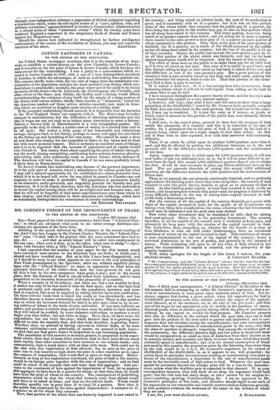TO THE EDITOR OF THE SPECTATOR.
Uxbridge, 23d October 1843.
Sea—I think your correspondent, " A Liberal Elector," in his letter of the 9th instant, fails in attempting to refute Mr. COBDEN'S argument, that a re- vival of manufactures is consequent upon moderate prices of food. For in- stance, suppose that during a given period, when the expenditure for food is 60,000,000/. per annum more than another period, the wages of the agricul- tural labourer, or of the mechanic, are at the rate of 14s. per week ; and that out of his wages he can appropriate only 2s. weekly in the purchase of manu- factured goods, when at another period, during which the price of provisions is reduced, he can expend 4s. weekly for that purpose. Mr. COBDEN assumes that this 2s. difference in the amount which the poor man. lays out in food goes into the pockets of the corn-seller or grower and landowner, and in con- sequence does not circulate among the manufacturers : but your correspondent maintains, that the expenditure in manufactured goods is the same, only that the class of spenders is changed; forgetting, that among the wealthier part of the community, the difference between high and low prices in bread and meat would be comparatively so small an item of deduction from their income as to be scarcely heeded, and certainly not likely to lessen the sum which they would ordinarily spend in manufactures ; and as in the annual consumption of bread and meat in this country the proportion eaten by the labouring class more than by the rich would be as 4 to 1, Mr. COBDEN'S argument, to the extent of 48,000,000L of the 60,000,000/., is, as it appears to me, well grounded; for unless there be particular circumstances creating or counteracting stimulant in favour of the manufacturer, a depression in the sale of manufactured goods must be the inevitable result of high prices in food. Whatever the poor than spends for provisions beyond the average price will be a loss to the manufac- turer, unless what the wealthier gain is expended in that channel. If, as your correspondent assumes, they only dealt at one shop, his argument would hold good; but the rich man has many shops, or other outlets for his surplus in- come—yachting, sporting, Continentalizing, &c. I am an opponent to Mr. COBDEN'S principles of free trade, and therefore should regret to see such of his arguments as are reasonable and tenable controverted on fallacious grounds, as false positions evidence the weakness of the cause in the defence of which they are used.
1 am, Sir, your most obedient servant, A SUBSCRIBER.


























 Previous page
Previous page